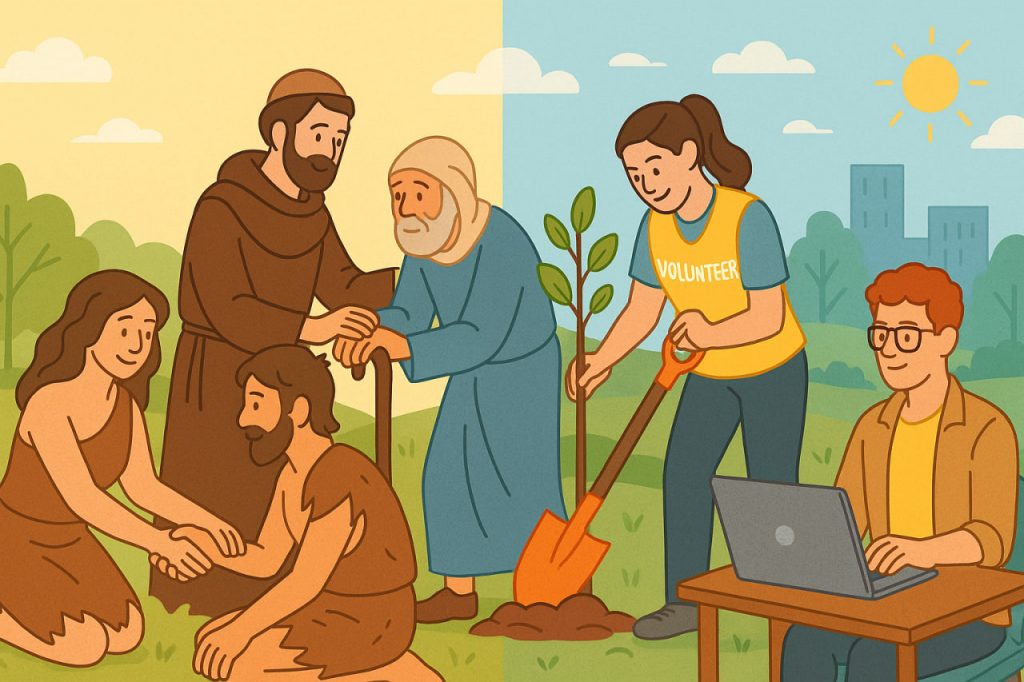Volunteering, as a form of selfless help and social cooperation, has accompanied humanity since the dawn of civilization. Long before the word “volunteer” appeared, people were already helping their communities — caring for the sick, supporting the poor, and uniting in times of disaster. The evolution of volunteering reflects the moral and social growth of human societies, showing how compassion gradually became an organized and global force for good.
Early Origins: The Spirit of Community
The roots of volunteering stretch back to ancient times. In early tribal societies, helping others was essential for survival — food, shelter, and protection were shared collectively. Ancient cultures such as Egypt, Greece, India, and China valued acts of charity and mutual aid as moral duties. Temples and religious institutions often served as centers of social assistance, offering food and medical care to those in need. The concept of altruism — helping others without personal gain — was deeply tied to spiritual beliefs about harmony and balance.
The Middle Ages: Charity and Faith
During the Middle Ages, organized volunteering was largely connected to religion. Monks, nuns, and members of various religious orders dedicated their lives to helping the poor and the sick. The Knights Hospitaller and similar groups established hospitals and shelters across Europe and the Middle East. Charity became a central expression of faith, leading to the creation of the first permanent institutions for social care. These early acts laid the groundwork for future humanitarian organizations.
The 18th–19th Centuries: The Rise of Social Responsibility
The Industrial Revolution brought rapid urbanization and new social challenges — poverty, child labor, and overcrowded cities. In response, citizens began forming volunteer-based organizations to address these issues. The Red Cross, founded in 1863 by Henri Dunant, became one of the first global humanitarian movements, promoting the idea of neutral volunteer assistance during war and disaster. Around the same time, public libraries, schools, and hospitals started relying on volunteer support.
The 20th Century: Volunteering Goes Global
The 20th century marked the true expansion of organized volunteering. After both World Wars, countless people joined humanitarian efforts to rebuild communities and provide aid to refugees. The creation of the United Nations (UN) and its programs, such as UN Volunteers (1970), turned volunteering into an international institution. Meanwhile, non-governmental organizations like Doctors Without Borders and Habitat for Humanity showed how collective compassion could transcend borders and politics.
The Modern Era: Digital and Inclusive Volunteering
Today, volunteering has adapted to the digital age. People can now support causes online — from mentoring students virtually to coordinating global environmental campaigns. Modern volunteerism also emphasizes inclusion, ensuring that everyone, regardless of age, gender, or background, can contribute. Environmental and social movements have turned volunteering into a driving force for sustainability and peace.
The Universal Message
Through every era, volunteering has carried the same message: humanity thrives when people help one another. What began as simple acts of survival has evolved into a worldwide network of kindness that strengthens communities, protects the planet, and reminds us of our shared responsibility for life on Earth.
Interesting Facts
- The word “volunteer” first appeared in English in the 17th century, originally referring to people who enlisted in the military by choice.
- The Red Cross now has more than 97 million volunteers worldwide.
- In 2001, the United Nations declared it the International Year of Volunteers.
- Digital volunteering platforms allow people to contribute to global causes without leaving their homes.
Glossary
- Altruism — selfless concern for the well-being of others.
- Humanitarian aid — assistance provided to people in need during crises.
- Non-governmental organization (NGO) — a nonprofit group that operates independently of governments.
- Inclusion — ensuring equal access and participation for all individuals.
- Sustainability — responsible use of resources to protect future generations.


